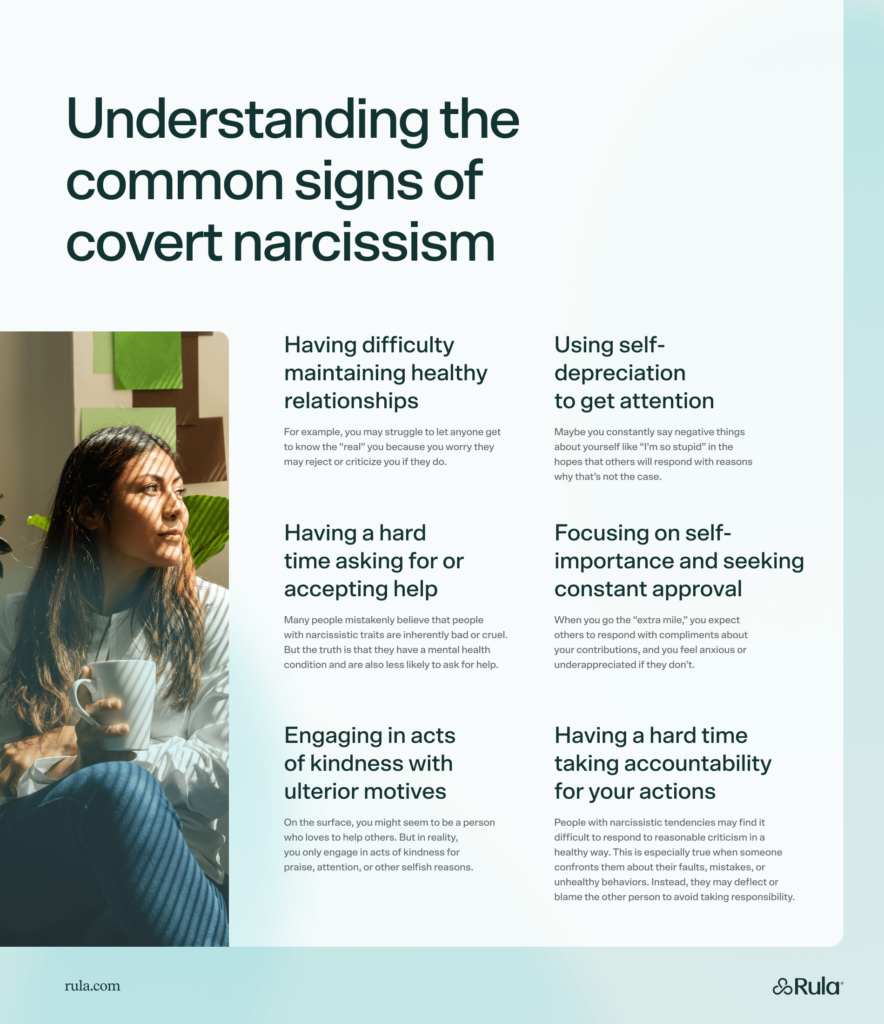Most people are familiar with the term “narcissism.” But you may not know that it comes in a variety of forms.
All forms of narcissism involve grandiose thinking, inflated self-importance, and an intense fear of rejection. But people living with covert narcissism turn these symptoms inward. This makes covert narcissism harder to detect.
Covert narcissism is not an officially recognized mental health condition. But some of the treatments for narcissistic personality disorder may be helpful for people living with covert narcissism.
The term “narcissism” is one of those clinical mental health terms that’s made its way into everyday conversation in recent years. But it’s important to note that a person can exhibit traits of narcissism without meeting the diagnostic criteria for narcissistic personality disorder.
Most people understand a “narcissist” as someone with an inflated ego and a lack of empathy. But this definition only represents a part of the narcissism spectrum. There’s a less obvious form of narcissism that can be subtler and more challenging to detect. It’s called covert narcissism, and learning more about it can help you identify it in yourself or others.
The care you need, when you need it
Learn how Rula can support your mental health journey
What is covert narcissism?
Most people living with common, more detectable forms of narcissism have a deep sense of grandiosity and superiority. Some people say they can sense narcissism just by being in the same room as someone who has this quality.
As the name suggests, covert narcissism is less obvious. Unlike more traditional presentations, people with covert narcissism may have low self-esteem and appear shy or withdrawn. They may not show the outward sense of dominance or aggression associated with overt narcissism. Internally, however, they feel a deep sense of self-importance, fear of rejection, and desire for attention.
People living with all forms of narcissism often have trouble maintaining relationships. This stems from a lack of empathy and difficulty prioritizing others’ needs.
Narcissism can also cause hypersensitivity to criticism that can lead to social isolation. Some research even suggests that covert narcissism may be worsened by social media use. People living with the condition have an intense fear of feedback that may become worse when they engage with others online.

Six signs and symptoms of covert narcissism
Covert narcissism can be harder to detect than other forms of narcissism. While they may be subtle, some common signs and symptoms include:
Having difficulty maintaining healthy relationships: For example, you may struggle to let anyone get to know the “real” you because you worry they may reject or criticize you if they do.
Using self-depreciation to get attention: Maybe you constantly say negative things about yourself like “I’m so stupid” in the hopes that others will respond with reasons why that’s not the case.
Having a hard time asking for or accepting help: Many people mistakenly believe that people with narcissistic traits are inherently bad or cruel. But the truth is that they have a mental health condition and are also less likely to ask for help.
Focusing on self-importance and seeking constant approval: When you go the “extra mile,” you expect others to respond with compliments about your contributions, and you feel anxious or underappreciated if they don’t.
Engaging in acts of kindness with ulterior motives: On the surface, you might be a person who loves to help others. But in reality, you only engage in acts of kindness for praise, attention, or other selfish reasons.
Having a hard time taking accountability for your actions: People with narcissistic tendencies may find it difficult to respond to reasonable criticism in a healthy way. This is especially true when someone confronts them about their faults, mistakes, or unhealthy behaviors. Instead, they may deflect or blame the other person to avoid taking responsibility.
What is the difference between covert and overt narcissists?
The main difference between overt and covert narcissists is an internal versus external presentation of symptoms. A covert narcissist turns their symptoms inward, and that’s what makes the condition harder to detect. On the other hand, an overt narcissist will behave in ways that make their sense of superiority and other symptoms obvious.
While both overt and covert narcissists can demonstrate any of the symptoms of narcissistic personality disorder listed below, only the overt narcissist will demonstrate them publicly.
Inflating their talents and achievements (grandiosity)
Fixating on fantasies of gaining more power, success, beauty, etc.
Adhering to the belief that they are exceptional and can only be understood or accepted by other exceptional people
Constantly seeking affirmation and admiration from others
Demonstrating entitlement and a belief that they deserve to be treated better than others
Manipulating or taking advantage of others for personal gain
Having an inability to demonstrate empathy or concern for others’ needs or feelings
Frequently behaving in cruel or arrogant ways without remorse
Believing that others are envious of them or often feeling envious of others
What causes covert narcissism?
Covert narcissism is not an officially recognized and diagnosable mental health condition. Rather, it’s a common presentation of narcissistic personality disorder. Because it’s an unofficial presentation, there’s not a lot of research on covert narcissism specifically. However, according to the research that does exist, there are some childhood experiences that may make you more likely to develop narcissistic personality disorder.
These include:
Being a survivor of abuse or neglect
Experiencing trauma
Having parents who were excessively judgemental
Having parents that gave you constant, excessive praise
Other factors that may contribute to narcissistic personality disorder include having a close relative who also experiences narcissism or having certain neurobiological traits.
How is covert narcissism treated?
Many people with narcissism resist treatment. This is due to an inability to see their thoughts or behavior as unhealthy. In addition, research shows that more than half of people with narcissistic personality disorder do not follow their treatment plans. This leads to fewer positive outcomes for this population.
However, people living with covert narcissism may benefit from some of the treatments used for narcissistic personality disorder, including:
Therapy: Attending individual, group, or couples therapy can help you interrupt unhelpful patterns, learn new coping skills, and practice healthy ways of relating to others. It can also help you improve your self-esteem, understand your emotions, and discover new ways of responding to stressful situations.
Medication: There aren’t currently medications that can treat narcissism. However, many people living with narcissistic personality disorder also have other co-occurring mental health conditions, like depression. Treating symptoms of other conditions can help improve your symptoms overall.
Committing to care: Living with covert narcissism can leave you feeling like therapy might not be worth your time. But it’s important to try to keep an open mind, attend your sessions consistently, and stay focused on your goals for treatment.
If you or someone you care about is experiencing domestic violence, you can call the National Domestic Violence Hotline at 800-799-7233 or text 88788 to the same number.
Find care with Rula
If you or someone you care about is living with symptoms of covert narcissism, know that you’re not alone.
At Rula, we’re here to help you find support for narcissism and co-occurring mental health conditions without a long wait for an appointment. In just a few clicks, we can connect you with a therapist and, if needed, a psychiatric provider who takes your insurance. From there, you can begin receiving the specialized care you deserve from the comfort of your home as soon as tomorrow.
Rula's editorial process
Rula's editorial team is on a mission to make science-backed mental health insights accessible and practical for every person seeking to better understand or improve mental wellness.
Members of Rula’s clinical leadership team and other expert providers contribute to all published content, offering guidance on themes and insights based on their firsthand experience in the field. Every piece of content is thoroughly reviewed by a clinician before publishing.





